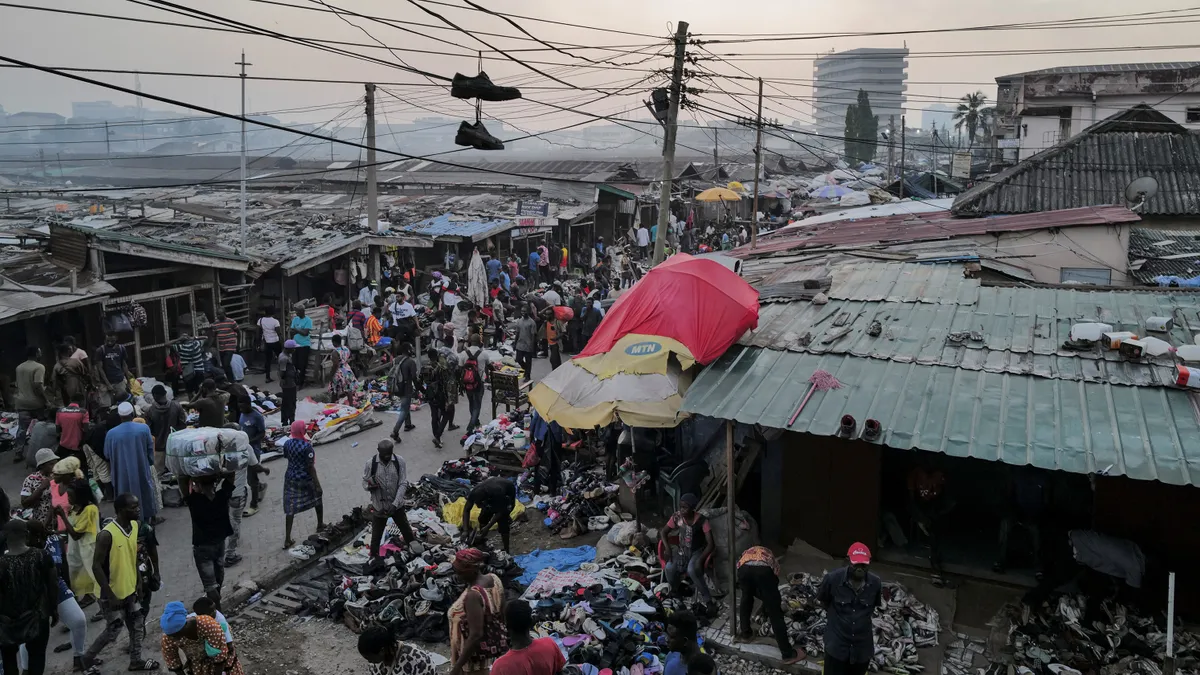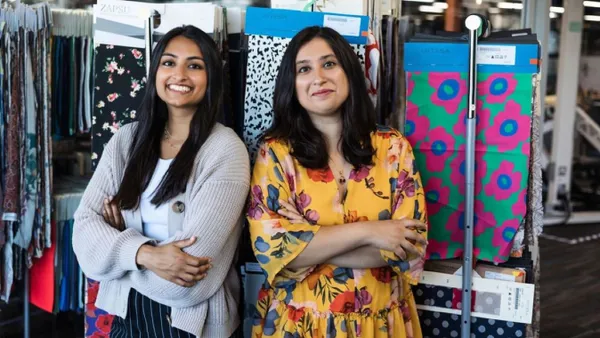Dive Brief:
- Less than 5% of imported used clothing that arrives for resale at Ghana’s Kantamanto market in Accra could be considered waste, according to a May 13 report from the Ghana Used Clothing Dealers Association, also known as GUCDA. The finding contradicts “claims about the (secondhand clothing) in Ghana that dominate the narrative” in the media, including that “40% of clothing items in imported bales are considered waste and almost immediately discarded,” according to the report.
- The 40% figure comes from the U.S. and Ghana-based Or foundation, a nonprofit that works on waste and human welfare issues at Kantamanto, GUCDA told Fashion Dive in an email. However, a 2022 study from the Or Foundation stated that, similar to the GUCDA findings, only 4% of an incoming bale of used clothing could be considered waste. The 40% figure refers to the amount of clothing that vendors cannot sell and that leaves the market as waste.
- The GUCDA report also states that 64% of 621 shoppers interviewed at Kantamanto market say they have not seen waste clothing in public spaces. However, a spokesperson from the Or foundation told Fashion Dive in an email that the foundation collects more than 30 tons of waste, including textile waste, from beaches each month, and one ton of textile waste each month from Kantamanto.
Dive Insight:
Ghana is the second-biggest importer of used clothing in Africa, according to BACI, an international trade database. In Ghana, the second-hand clothing trade employs 2.5 million people, contributing $29.5 million to government revenue via import taxes alone, according to GUCDA report. Used clothing imports totaled $164 million in 2022, with the United Kingdom, China, and Canada as the top three sources, per the report.
Kantamanto Market has made headlines in recent years with reports of rising amounts of clothing waste and photographs of clothes washed up on beaches.
GUCDA’s findings “demonstrated that the prevailing international perception is not only wrong, but economically unsound and deeply patronising,” according to GUCDA’s press release. The organization represents second-hand clothing importers and dealers in Ghana.
Liz Ricketts, co-founder and executive director of the Or Foundation, said that textile waste has visibly increased since she began working in Ghana in 2011, corresponding to the rise of fast fashion. “I never saw any clothing waste on the beaches,” she said. “Thirteen years later, there's piles of clothing waste taller than I am.”
Jeffren Boakye Abrokwah, chairperson of GUCDA, said in an email to Fashion Dive that GUCDA is concerned about proposals made in March by Danish, French, and Swedish ministers to the European Union Environmental Council. The ministers proposed that the Basel Convention for toxic waste exportation be amended to include textile waste. This would mean “requiring prior informed consent to be obtained for the import and export of textile waste,” and “banning the export of hazardous textile waste (e.g. stained with chemicals or paint) altogether,” according to the proposal text. Second hand resellers in Kenya have also lobbied against the proposal, according to a report from Politico.
GUCDA thinks the proposal would make it more difficult to export secondhand clothing to the EU, Abrokwah said, thus jeopardizing “millions of jobs and livelihoods” related to the second-hand clothing trade across Africa.
“This situation arises from the western media’s coverage of textile issues being dominated by activists who use unverified figures and make false allegations about the second-hand clothes trade,” Abrokwah said. “They have no real understanding of this trade in Africa. Yet their claims have clearly influenced policy makers in the Global North.”
The Or Foundation has never proposed banning imports, which will probably increase as fast fashion continues, Ricketts said. Instead, it has called for brands to reduce production and lobbied the European Union for extended producer responsibility legislation to cover how discarded textiles are disposed of internationally, thus aiding, for example, in the removal of clothing waste from the Kantamanto market.










